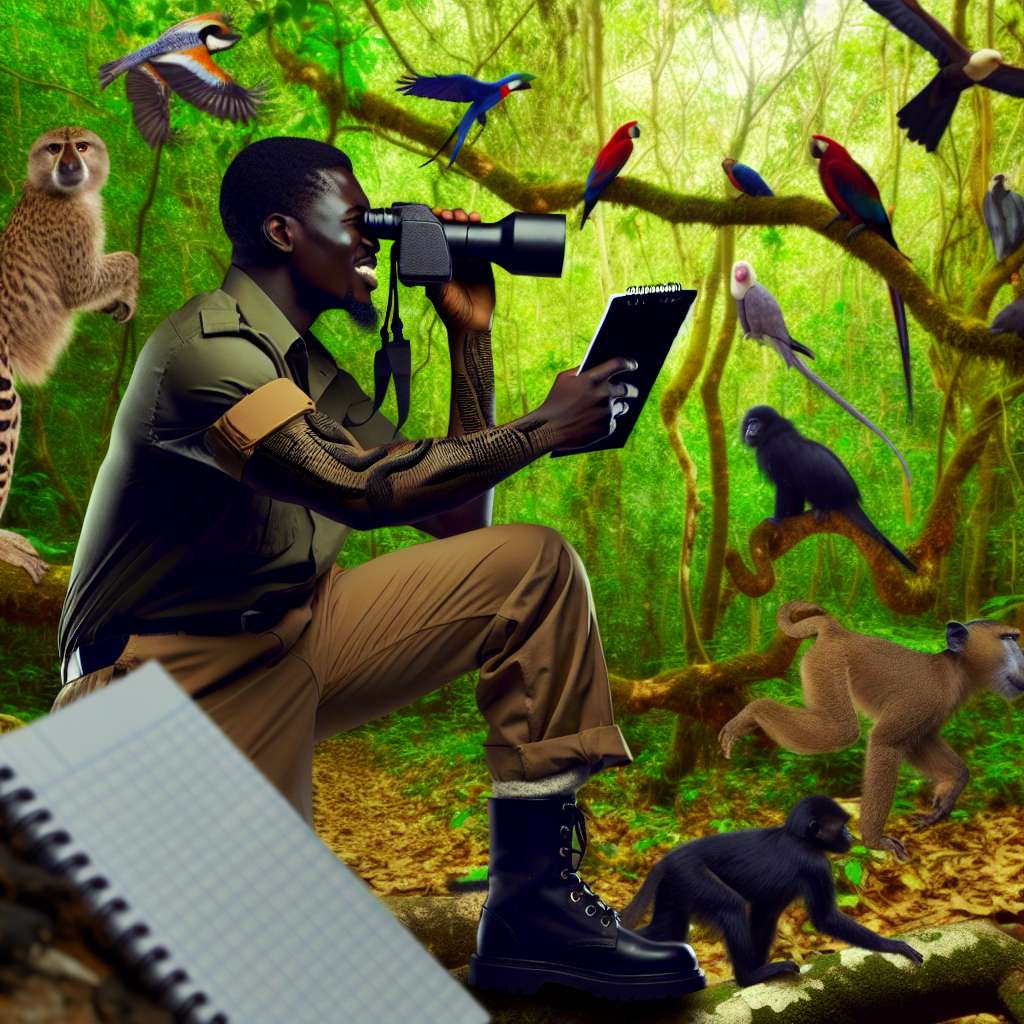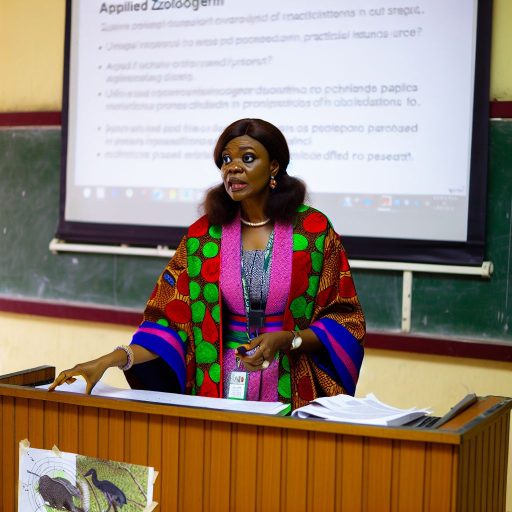Introduction
A crucial aspect of maintaining ecological balance is understanding the impact of animal biology within ecosystems.
In Nigeria, a country known for its diverse ecosystems ranging from rainforests to savannas, animals play a vital role in shaping these habitats.
From the mighty elephants in the forests to the tiny insects in the grasslands, each animal contributes to the functioning and stability of its respective ecosystem.
By studying animal biology, scientists can gain valuable insights into the intricate relationships between different species and their environment.
Furthermore, the presence of certain keystone species in Nigerian ecosystems can have far-reaching effects on the overall ecosystem health.
For example, the decline of apex predators like lions or leopards can lead to an overpopulation of herbivores, disrupting the delicate balance of the food chain.
As such, a deeper understanding of animal biology is essential for conservation efforts and sustainable management of Nigerian ecosystems.
By recognizing the interconnectedness of all living organisms, we can work towards preserving these natural habitats for future generations.
Overview of Nigerian ecosystems
In Nigeria, there are several diverse ecosystems that contribute to the country’s rich biodiversity.
Rainforests
- Rainforests in Nigeria are found in the southern part of the country, especially in areas like Cross River and Edo states.
- These forests are characterized by high rainfall, dense vegetation, and a wide variety of plant and animal species.
- They are home to unique species such as the Nigerian chimpanzee, drill monkeys, and a diverse array of bird species.
- The rainforests play a crucial role in regulating the local climate, maintaining soil fertility, and supporting local communities.
Savannas
- Savannas are primarily found in the central and northern regions of Nigeria, covering vast expanses of land.
- These ecosystems are characterized by a mix of grasslands and scattered trees, adapting to the semi-arid conditions.
- They are home to iconic African wildlife such as elephants, giraffes, lions, and various antelope species.
- Savannas provide grazing grounds for wildlife and support pastoral communities that rely on livestock for their livelihood.
Wetlands
- Wetlands in Nigeria are found in coastal areas, river deltas, and inland basins, serving as vital habitats for various species.
- These ecosystems are characterized by seasonal flooding, nutrient-rich waters, and diverse plant and animal life.
- They support migratory birds, fish species, and provide breeding grounds for amphibians and reptiles.
- Wetlands play a crucial role in regulating water flow, purifying water, and protecting coastal areas from erosion.
Nigerian ecosystems showcase a remarkable diversity of landscapes, flora, and fauna.
These ecosystems contribute to the country’s natural heritage and ecological significance.
Introduction
Animals play a vital role in maintaining the delicate balance and sustainability of Nigerian ecosystems.
Contribution to Ecosystem Balance
- Animals help regulate the population of other species, preventing overpopulation.
- They aid in pollination, ensuring the reproduction of plants for ecosystem stability.
- Animals contribute to nutrient cycling by decomposing organic matter, which enriches the soil.
- Predators keep herbivore populations in check, preventing overgrazing of vegetation.
Keystone Species in Nigeria
- Elephants: They play a significant role in seed dispersal, shaping the distribution of plant species.
- Crocodiles: They help control fish and insect populations in aquatic ecosystems.
- Nigerian Dwarf Goats: They are essential for weed control and pasture management.
- Green Sea Turtles: Their presence influences coastal flora and fauna dynamics.
Influence on the Environment
- Keystone species like elephants maintain biodiversity by dispersing seeds of various plant species.
- Crocodiles regulate fish populations, preventing one species from dominating and causing imbalance.
- Nigerian Dwarf Goats control invasive plant species, promoting the growth of native vegetation.
- Green Sea Turtles contribute to the health of seagrass beds and coral reefs by grazing on algae.
Importance of Animal Biology in Ecosystems
The role of animal biology in Nigerian ecosystems is undeniable.
Keystone species, in particular, have a significant impact on the environment.
They help maintain balance and sustainability for the benefit of all organisms in the ecosystem.
See Related Content: Environmental Applications of Geophysics in Nigeria
Biodiversity conservation efforts in Nigeria
Conservation of animal species in Nigeria is crucial for maintaining the balance within ecosystems.
Protecting animals helps preserve biodiversity, ensuring the survival of different species in their natural habitats.
By safeguarding animal populations, we can prevent the negative impacts of species extinction on ecosystems.
Animals play vital roles in various ecosystems, contributing to nutrient cycling and maintaining ecological balance.
Conservation efforts focus on protecting keystone species that have a significant impact on ecosystem health.
Preserving animal species helps sustain food chains, regulating population levels and supporting diverse habitats.
Protecting wildlife habitats is essential for ensuring the survival of endangered animal species in Nigeria.
Conservation initiatives aim to address threats such as habitat loss, poaching, and climate change affecting animal populations.
Efforts to protect animal species involve collaboration between government agencies, NGOs, and local communities.
Engaging the public in conservation programs raises awareness about the importance of preserving Nigerian ecosystems.
Conservation organizations and initiatives in Nigeria
Several organizations in Nigeria are actively involved in biodiversity conservation efforts across the country.
The Nigerian Conservation Foundation (NCF) is a leading organization working to protect the country’s natural heritage.
NCF collaborates with government agencies and other stakeholders to implement conservation projects and initiatives.
The Wildlife Conservation Society (WCS) Nigeria focuses on protecting endangered species and ecosystems in the country.
WCS conducts research, advocacy, and community engagement to support conservation efforts in Nigeria.
The Nigerian National Parks Service manages protected areas to safeguard wildlife habitats and biodiversity.
Through strategic partnerships and community involvement, the Parks Service ensures the sustainable management of national parks.
Other conservation organizations like the Rainforest Conservation Foundation work to protect forest ecosystems and wildlife in Nigeria.
These organizations conduct research, conservation education, and advocacy to promote sustainable practices in biodiversity conservation.
Collaborative efforts between conservation organizations and government agencies are essential for effective wildlife protection in Nigeria.
By supporting these initiatives, individuals can contribute to the preservation of Nigeria’s rich biodiversity and ecosystem health.
You Might Also Like: Government Policies on Environmental Biology in Nigeria
Nigerian Ecosystem Threats from Human Activities
When it comes to the delicate balance of Nigerian ecosystems, there are several threats that impact animal biology and habitats.
These threats are mainly due to human activities that have led to severe consequences for the local fauna and flora.
Transform Your Career with Expert Guidance
Get personalized mentorship consulting that’s tailored to your unique path. Our expert advice is actionable and exclusive.
Get StartedIdentifying Human Activities That Negatively Impact Animal Populations and Habitats
One significant threat to Nigerian ecosystems is deforestation, which is primarily driven by the clearing of land for agricultural purposes and logging.
This has resulted in the destruction of essential habitats for many species, leading to a decline in animal populations.
Another human activity that negatively impacts animal populations is poaching.
Poachers target various species for their skins, tusks, horns, and other body parts, leading to a significant decrease in numbers and even pushing some species to the brink of extinction.
Pollution is also a severe threat to Nigerian ecosystems, with industrial activities and urbanization leading to the contamination of water sources and soil.
This pollution affects the health of animals and the quality of their habitats, resulting in a decline in biodiversity.
Urban expansion is another factor that has a detrimental impact on animal populations and habitats.
As cities grow and spread into natural areas, they disrupt ecosystems, fragment habitats, and increase human-wildlife conflicts, ultimately affecting the survival of many species.
Climate change is yet another threat that poses a significant challenge to Nigerian ecosystems.
The increase in temperatures, changes in rainfall patterns, and extreme weather events have altered habitats and disrupted animal behaviors, leading to further risks for their survival.
Discussion on the Need for Sustainable Practices to Mitigate These Threats
Given the critical situation facing Nigerian ecosystems, it is essential to adopt sustainable practices to mitigate the threats posed by human activities.
One crucial step is to promote conservation efforts and raise awareness about the importance of preserving biodiversity.
Implementing stricter regulations and enforcement against deforestation and illegal poaching is vital to protect animal populations and their habitats.
This includes penalties for offenders and monitoring systems to track and prevent illegal activities that harm wildlife.
Reducing pollution through sustainable waste management practices and the promotion of clean energy sources can help minimize the adverse effects on animal biology and ecosystems.
This includes stricter controls on industrial emissions and waste disposal to reduce contamination levels.
Encouraging responsible urban planning and development can help minimize the impact of urban expansion on natural habitats.
This includes zoning regulations that protect critical wildlife areas, creating green spaces within cities, and implementing wildlife corridors to allow animals to move freely between fragmented habitats.
Addressing climate change through mitigation and adaptation strategies is crucial for the long-term survival of Nigerian ecosystems.
This includes reducing greenhouse gas emissions, promoting sustainable land use practices, and implementing measures to protect vulnerable species from the impacts of climate change.
Uncover the Details: Prominent Nigerian Applied Botanists to Know

Case Studies of Animal Biology in Nigerian Ecosystems
When we examine specific animal species in Nigerian ecosystems, we can understand their ecological roles better.
Let’s delve into some case studies to see the impact of animal biology on these ecosystems.
Nigerian Chimpanzees
- Nigerian chimpanzees play a crucial role in seed dispersal, which helps maintain the biodiversity of forests.
- However, habitat destruction due to deforestation poses a significant threat to their survival.
- Conservation efforts such as creating protected areas and raising awareness have been successful in some regions.
Nigerian Elephants
- Nigerian elephants are essential for maintaining the balance of vegetation in savannas and forests.
- Poaching for ivory and habitat loss have led to a decline in their population, making them a vulnerable species.
- Conservation organizations are working on anti-poaching campaigns and habitat preservation to protect Nigerian elephants.
Nigerian Sea Turtles
- Nigerian sea turtles play a vital role in marine ecosystems by controlling jellyfish populations and nutrient cycling.
- However, they face threats such as coastal development, pollution, and poaching for their eggs and meat.
- Conservation efforts focus on nesting beach protection, raising awareness, and implementing sustainable fishing practices.
Nigerian Pangolins
- Nigerian pangolins are essential for insect control and soil health, making them a keystone species in the ecosystem.
- Illegal wildlife trade for their scales and meat has pushed them to the brink of extinction.
- Conservation initiatives involve combating poaching and trafficking, as well as habitat preservation for Nigerian pangolins.
Nigerian Lions
- Nigerian lions are top predators that help regulate prey populations and maintain ecosystem balance.
- They face threats such as habitat fragmentation, human-wildlife conflict, and retaliatory killings.
- Conservation efforts include community-based initiatives, wildlife corridors, and education programs to protect Nigerian lions.
These case studies demonstrate the intricate relationships between animal biology and Nigerian ecosystems.
By understanding the ecological roles of specific species and the challenges they face, we can work towards conserving biodiversity and ensuring the sustainability of these ecosystems.
Learn More: Career Opportunities in Applied Microbiology Nigeria
Impact of Animal Biology on Nigerian Ecosystems
The impact of animal biology on Nigerian ecosystems cannot be overstated.
Animals play a crucial role in maintaining the balance of these diverse habitats.
It is essential to recognize the significance of animal biology in preserving biodiversity and ecosystem health in Nigeria.
Continued research is necessary to understand the complex interactions between species.
Conservation efforts are crucial to protect endangered species and ensure the sustainability of ecosystems.
Sustainable management practices are needed to mitigate human-wildlife conflicts and habitat destruction.
With the growing threats to the environment, it is vital to emphasize the need for proactive measures to safeguard Nigerian ecosystems.
Through education, awareness, and collaboration, we can work towards a more sustainable future for both animals and humans.
It is imperative that we prioritize research, conservation, and sustainable management to protect the rich biodiversity of Nigerian ecosystems.
Only by working together can we ensure a harmonious coexistence between wildlife and human populations.
Additional Resources
Plastic pollution in the environment in Nigeria: A rapid systematic …
Spatial distribution and ecological niche modeling of geographical …




